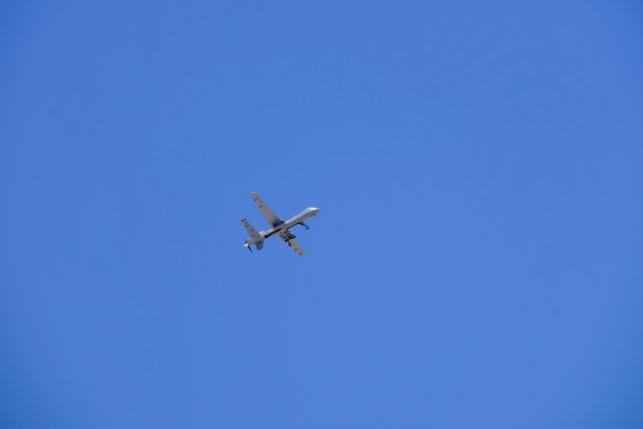US says kills up to 116 civilians in strikes outside war zones
WASHINGTON: The US government accepted responsibility on Friday for inadvertently killing up to 116 civilians in strikes in countries where America is not at war, a major disclosure likely to inflame debate about targeted killings and use of drones.
President Barack Obama's goal for the release of the numbers, which are higher than any previously officially acknowledged but vastly below private estimates, is to create greater transparency about what the US military and CIA are doing to fight militants plotting against the United States.
But the figures, which covered strikes from the day Obama took office in January 2009 through Dec. 31, 2015, were below even the most conservative estimates by non-governmental organizations that spent years tallying US strikes in countries such as Pakistan, Yemen and Somalia.
"The numbers reported by the White House today simply don’t add up and we're disappointed by that," said Federico Borello, executive director for the Center for Civilians in Conflict.
Drone advocates, including those within the US military, argue the strikes are an essential part of reducing the ability of militant groups to plot attacks against the United States. They say the government goes to great lengths to avoid civilian casualties.
Critics of the targeted killing program question whether the strikes create more militants than they kill. They cite the spread of jihadist organizations and militant attacks throughout the world as evidence that targeted killings may be exacerbating the problem.
"We're still faced with the basic question: Is the number of bad guys who are taken out of commission by drone strikes greater or less than the number of people who are inspired to turn to violent acts," said Paul Pillar, a former senior CIA specialist on the Middle East and now a professor of security studies at Georgetown University.
Pakistani lawyer Mirza Shahzad Akbar, who says he represents a hundred families of civilians killed by drones, questioned the validity of the data even before their release by the Director of National Intelligence.
He said Washington needed to better explain its criteria for declaring someone a civilian, something that can be difficult to do from a camera on a drone.
"President Obama is worried about his legacy as a president who ordered extra-judicial killings of thousands which resulted in a high number of civilian deaths," Akbar told Reuters.
"As a constitutional lawyer himself, he knows what's wrong with that."
BEYOND THE EDGES OF US WARS
Obama issued an executive order on Friday requiring annual disclosure of such strikes, which fall outside America's conventional wars.
Such data do not include strikes in Afghanistan, Iraq and Syria, significantly lowering the number of casualties. In Afghanistan, for example, 42 people were killed and 37 wounded in a mistaken US military strike on a hospital in the Afghan city of Kunduz last year.
A US official, speaking to Reuters on condition of anonymity, said the total of 473 strikes disclosed by the Obama administration on Friday included strikes in Pakistan, Yemen and Somalia.
Many of those are believed to have taken place in Pakistan, where NGOs also say a large number of civilians were killed.
The New America think tank estimated up to 315 civilians have been killed in Pakistan in US strikes since 2004 and the Bureau of Investigative Journalism believed the civilian death toll could be as high as 966.
In Somalia, the Bureau of Investigative Journalism estimates that up to 10 civilians were killed in up to 31 drone strikes since 2007.
"Last month, a drone killed a relative of mine and a dozen of his camels and goats," local elder Mohamed Ismail from Wanlaweyn in southern Somalia told Reuters.
Officials said the US disclosure of the data was meant partly to accept responsibility for such deaths.
"Anytime we inadvertently cause the death of a civilian, it's something that we deeply regret," a senior administration official said.
DO DRONE STRIKES WORK?
The question of whether drones spread militant extremism is unclear, many experts say.
"Time and again, the assertion is made that the impact is negative. Then when you look hard at the data, it becomes clear that it isn't clear where these opinions came from," said Anthony Cordesman at the Center for Strategic and International Studies in Washington.
Asfandyar Mir, a researcher and doctoral candidate at the University of Chicago, said research showed that CIA drone strikes in Pakistan's North Waziristan tribal agency corresponded with a reduction in insurgent violence and seriously disrupted the operations of the Pakistani Taliban, al Qaeda and the Haqqani network.
Mir and Dylan Moore of Stanford University studied data collected by three US universities showing that there were on average four to 11 fewer insurgent attacks per month in North Waziristan between 2008 and 2012, when CIA drone strikes surged, and 27 to 63 fewer casualties compared to 2007.
In 2007, there were about 12 attacks per month that produced about 55 casualties per month in the mountainous district bordering Afghanistan, an extremist stronghold where nearly 80 percent of the CIA drone strikes in Pakistan took place.
"The areas that were targeted by the drone strikes since 2008 have clearly been significantly less violent," Mir told Reuters, adding "They make it extremely difficult to organize."
Extremist groups "are organizations at the end of the day. They are like any other bureaucracy. They need men, they need money, they need to invest in coordination. Drones made the access to all these things extremely difficult," he said.
In Somalia, the acting governor of the Lower Shabelle region, Ali Nur, told Reuters that drones have killed several al Shabaab leaders while minimizing civilian casualties.
But he suggested the strikes could do more harm than good.
"They just infuriate Al Shabaab instead of eliminating it. They all attack a town, kill only one leader, stop operation and leave the town, allowing Al Shabaab to harass and massacre civilians and forcing them to join Al Shabaab."






